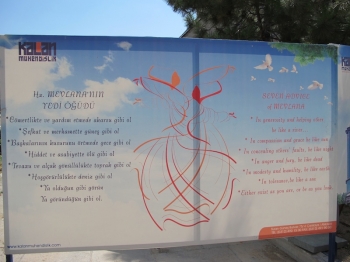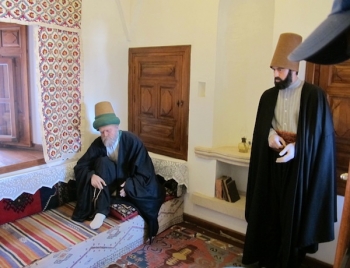Original Chinese text: Dr. Thomas Lau
Translation: Isabelle Tsang
English editing: Dr. Thomas Lau
This summer, the Anatolia Cultural & Dialog Centre of Turkey and the Hong Kong University Centre of Buddhist Studies Alumni Association jointly arranged a tour to Turkey. It offered the chance of a brief encounter of the Turkish cultural and religious life. Turkey is a secular country by constitution. In actual fact, more than 99% of the population is of Islamic background. Muslim practices are deeply seeded in the daily life of common people, and most people do not have any knowledge of Buddhism. During the tour, we visited the Mevlâna Museum and the tomb of Rumi in Konya, a city in central Turkey. The full name of Rumi (1207-1273) is Mevlânâ Celâleddin Mehed Rumi. He is a Sufi scholar, writer and poet, and he is one of the most famous masters in the history of Islam. Not only that his poetries are wide acclaimed, but his teachings are also very much inspiring and far-reaching. He teaches unconditional acceptance, tolerance, patience, love, compassion, and benevolence. His famous ‘Seven Advices’ has passed down all the years and is still very much revered in the present time. The Seven Advices epitomizes the highest sentiment of humanity, transcends religious boundaries, and encompasses the common values of all religions:
- In generosity and helping others: be like the river
- In compassion and grace: be like the sun.
- In concealing others’ faults: be like the night.
- In anger and fury: be like the dead.
- In modesty and humility: be like the soil.
- In tolerance: be like the ocean.
- Either you appear as you are, or: be as you appear.
Rumi teaches us that our generosity and help to others should be like the river, ever flowing. The Bodhisattvas in Buddhism understand that if one were to liberate oneself to full enlightenment, one has to liberate others simultaneously. This understanding becomes the main guidance in Bodhisattva practice: it is through helping others that one could help oneself. Unconditional or unattached generosity, giving, and helping others is known as dāna in Buddhism, which ultimately culminates into one of the perfections, the perfection of giving (dāna-pāramitā). According to the teaching of Diamond Sutra, making unattached dāna will lead to unimaginable merits. A heart of offering dāna to others originates from a heart of unconditional loving-kindness. This is why Buddhism points out that loving-kindness without condition is highest. Those who could really help oneself and liberate oneself always have an unconditional loving and compassionate heart toward others. He understands that the very moment that he is giving, he is already receiving. The giver simultaneously becomes the receiver, and there is no real difference between the benefactor and the beneficiary.
Rumi teaches that we have to forgive others’ wrongdoings, and bury our anger and hatred. Anger and hatred arise from not accepting others and their apparent wrongdoings. There is no absolute yardstick for wrongdoings, but there are man’s differentiations, judgments, and prejudices. Over the thousands of years, endless wars arise because of anger, hatred and enmity. The Twenty-first Century is still very young, but the world has already witnessed the ‘9-11’ disaster in America, the upheavals and killings in Afghanistan and Iraq, and the ongoing warfare in Syria. There is no long-lasting winner in a war, but war brings immense suffering to the people, and lives are meaninglessly wasted. It is a failure before it starts. On this aspect, the 6th Patriarch Wei-neng had said:
“If one is to be a true cultivator of the Way,
One will not see the wrongs of the world.
In seeing other people’s faults,
We ourselves then commit a fault;
In considering others but not ourselves in fault
Ourselves are automatically in fault.
As long as we eliminate any inclination to see faults,
Defilements will then be smashed, removed and destroyed;
Without neither hatred nor craving bothering our mind,
We can rest in peace with both legs relaxingly stretched out.”
(Platform Sutra Chapter II: on prajña)
Only by forgoing anger, hatred and enmity that human beings can free themselves, and be truly liberated from fetters, anxiousness, bondages, and hindrances.
Rumi teaches us to be humble as the earth, and be tolerant like the sea. When we look at our mother earth, it is subject to all kinds of natural battering and human pollutions and exploitations. However our mother earth accepts all in quietude, silently absorbing all elements and nutrients of life and nourishing all life forms. In the same way, all rivers end in the ocean, and the ocean accepts each and every of them wholeheartedly without grudging or alterations. Rumi taught us that our tolerance towards others should be likewise.
Modesty and humility allow us to put down our preconceptions, personal differentiations and preferences. Our heart is then widely open and is ready to take up and absorb knowledge and opinions that the world offers. With that clarity one seeks the skillful and wholesome path, and avoids or amends those unwholesome ones. That is also what the 6th Patriarch taught:
“Now that our mind doesn’t cling to good or evil, we should avoid becoming immersed in emptiness and attached to stillness. Rather, we should become knowledgeable by studying extensively, so that we recognize our own mind and understand various Buddhist doctrines. We would then become congenial to others when dealing with them, unaware of the distinction between self and other, thus proceeding to Bodhi and to our unchanging true nature. “
(Platform Sutra Ch. VI; on repentance and remorse)
Patience and tolerance are the prime virtues in Buddhism. When some bad thing happens and appeared to be unbearable, people might feel deeply wounded. On deeper thought, no matter good or bad, things will happen when their causes and conditions are ripe; and what has happened is not for us to refute. On the other hand, to accept a bad thing in its entirety does not preclude us from examining and dealing with it rightfully and in the most effective way. Furthermore, total acceptance will help us to reduce our helplessness, anger and hatred, and reduce the chance of imposing our views on others which might seed further hatred and enmity. When we encounter something unpleasant, the “Four steps for Handling a Problem: A Proposition for Resolving Difficulties of Life” taught by Master Sheng Yen offers a very pragmatic solution: Face it; Accept it; Deal with it; Let go of it.
The last advice from Rumi is that one has to appear as one is, or be as one appears. In any faith and knowledge, knowing without practicing will not bring fruit. Appearance reflects one’s behavior and practice. When our outward appearance matches our inner self, it means that we have put our knowledge and faith into practice and action. The three basic steps to acquire wisdom in Buddhism are “listen, think, and practice”. “Listen” is listening to or learning the teaching of the Buddha. As Buddhist faith is based on knowledge rather than belief, “think” is to consider, check and assess in detail before accepting Buddha’s teaching. It is clear that the first two steps are to build our knowledge and faith. The final step is to put our learning into practice. Learning Buddhism without practice is only an academic exercise; practice makes one a genuine Buddhist.
Love and compassion do not have religious boundaries. In the mid twenty Century, the renowned American psychologist Dr. Carl Rogers (1902-1987) first proposed the person-centered theory of psychological counseling. He proposed that by holding the following three attitudes in the client-therapist relationship, namely: 1. unconditional positive regard; 2. empathy; 3. congruence, it is already adequate to help the client for positive changes from their negative emotions and maladaptive behaviors. Dr. Rogers is a Christian and spent most part of his life studying human psychology and behaviors. At one time he had also studied theology. However, he had transcended the framework of Christianity and work directly with human nature. Upon careful examination, unconditional positive regard equates to a heart of unconditional loving-kindness in Buddhism; an empathetic heart to the utmost is the ability to understand accurately the suffering of the client, and is the greatest compassionate heart in Buddhism; congruence is to be honest and true on the therapist side, and is the ability to practice what one sees. In the following decades numerous studies in psychology confirm Dr. Rogers’ theory, and the person-centered approach is just as effective as any other modern psychotherapy theories. Dr. Rogers’ three conditions have also become the core professional values of many contemporary workers in social work and other helping services.
Buddhism teaches the Four Immeasurable Attitudes (metta or loving-kindness; karuna or compassion; mudita or appreciative joy; upekkha or equanimity) to guide our behavior in the society. These encompass the advices of Rumi. While conditional love may contain seeds of craving or clinging, unconditional love represents the highest human sentiment towards another being, and raises the meaning of life to a supra-mundane echelon. There could only be one ultimate truth: that various religions could survive the test of time because they all touch the human’s heart by calling for love and acceptance among human beings. Unconditional love and acceptance is what distinguish man from animals. Human life consists of pleasure and sufferings, but it is exactly this very nature that offers human the chance to learn and practice to achieve Buddhahood. Love, compassion, care, and mutual help are the prime elements that help human to survive all disasters happened or yet to happen. The author wishes to conclude this essay with the following Chinese couplet:
天地不仁,以萬物為芻狗
人間有義,仗愛助得重生
Note:
This essay is originally written in Chinese. The first saying of the couplet is a quotation from Lao Tzu’s Tao Te ching, an old Chinese writing of more than 2500 years. It literally means: “Our mother nature shows no favoritism to all beings, and treat them all as straw dogs” (a dummy dog made of straw used in ceremonial services). The second saying is matched by this author, which states that: “loving-friendliness prevails in human; man relies on love and help to survive and thrive (in face of disasters)”


















